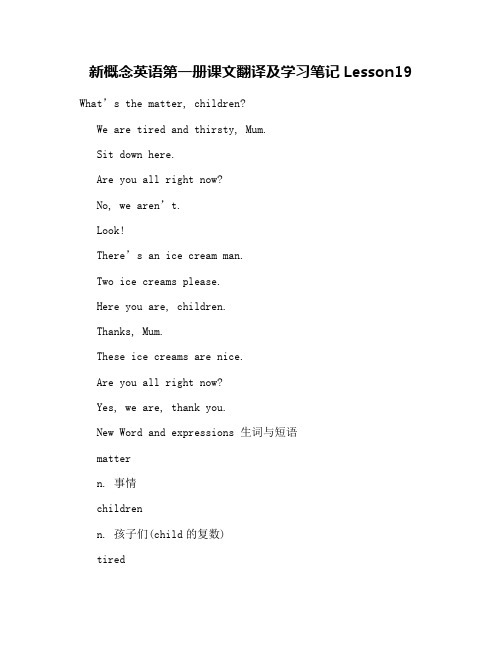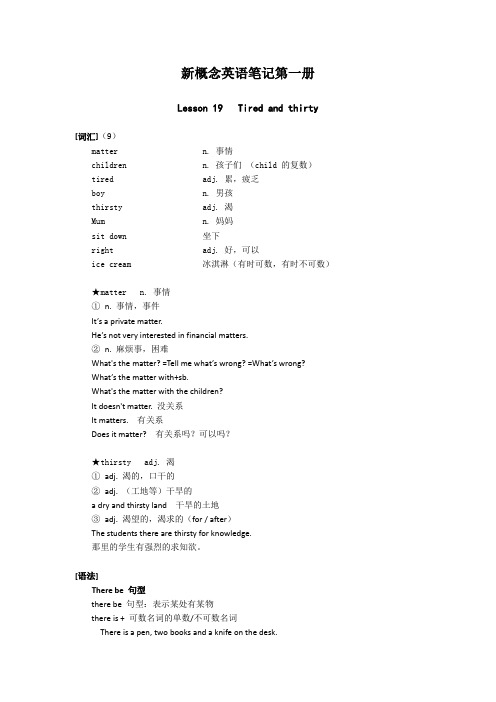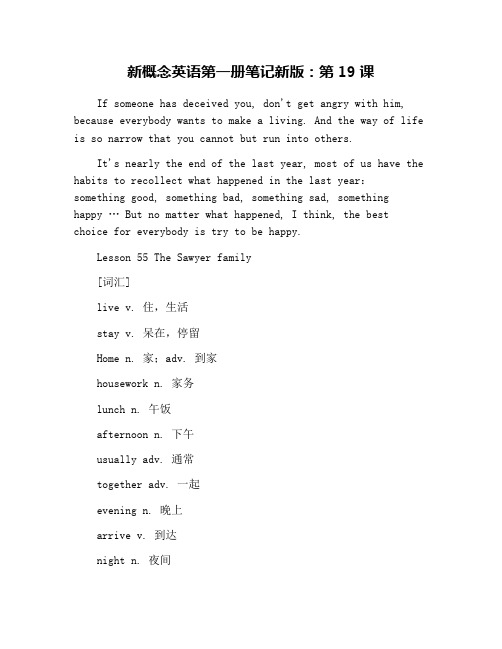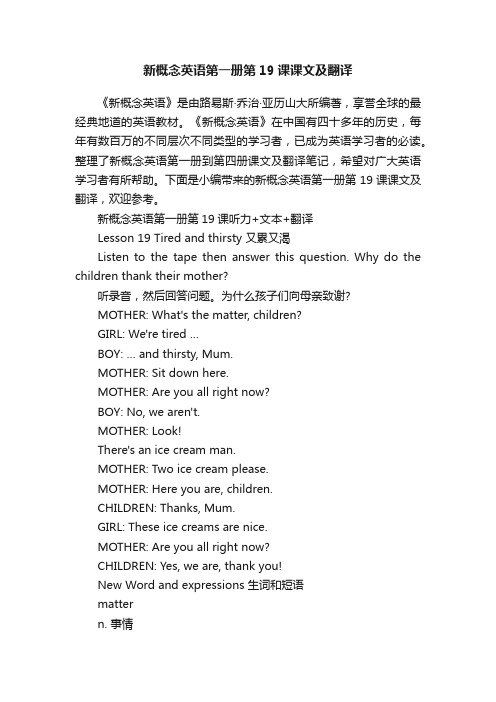新概念英语第一册Lesson19~24课文详注
新概念第一册(19-20)

又累又渴
New words and expressions
matter ['mæ tə] 事情 n。 children ['tʃɪldrən]孩子们 n tired [taɪəd] 累的 adj boy[bɒɪ]男孩n thirsty['θɜːstɪ]口渴的adj Mum [mʌm]妈妈n sit down 坐下 stand up 站起来 right[raɪt]好的,可以了adj ice aream 冰激凌 n
课文讲解
MOTHER:What's the matter,children? GIRL:We're tired.... BOY:...and thirsty,Mum. MOTHER:Sit down here. 讲解:1.What's the matter?What's up?What's wrong?What's happen? 2.we are= we're 缩写
课文讲解
MOTHER:Tow ice creams please. Here you are,children. CHILDREN:Thanks,Mum. GIRL: These ice creams are nice. MOTHER:Are you all right now? CHILDREN:Yes, we are,thank you.
课文语言点重点 来自 there +be 结构(1) 在询问人、物等存在时候用there+be结构,例如 There's an ice cream man比An ice cream man is there 更恰当自然,当出现there be句型放在句首 表示强调,结构中实际主语是be 后面的名词,如 果单数就用is ,复数用are. There is a book on the desk! There are some books on the desk!
新概念英语第一册自学笔记含课后练习答案:Lesson23-24

新概念英语第一册自学笔记含课后练习答案:Lesson23-24新概念英语第一册第23-24课课文详注 further notes on the text1.动词的双宾语在give me some glasses中,动词give后面有两个宾语,即直接宾语some glasses和间接宾语me。
人称代词作宾语时要用人称代词的宾格。
请参见lessons 21~22语法部分。
2.the ones on the shelf.是架子上的那几只。
本句是省略句,句首省略了i want。
句中的ones代表glasses。
on the shelf是介词短语,作定语,修饰ones。
3.these?这几只?是do you want these?的省略形式。
4.yes, please.是的,请拿给我。
当别人问你要不要某物而你同意要时,就可用这句话。
又如:假如你不同意要,则应说:no, thank you. 不,谢谢。
5.数字1,117,1,420,1,925,2,000的英文写法1,117----one thousand one hundred and seventeen1,420----one thousand four hundred and twenty1,925----one thousand nine hundred and twenty-five2,000----two thousand新概念英语第一册第23-24课语法 grammar in useon引导的介词短语(1)我们经常在名词、名词短语、代词或动名词前面用介词表示人物、事件等与其他人物、事件等之间的各种关系,如空间关系、时间关系、因果关系等。
介词始终带有宾语。
即使介词与宾语分开时,这种关系仍必定存有。
有很多固定的介词短语常可见到。
很多介词短语是由介词+名词(+介词)构成的,如:on time(准时),in the middle of(在……中间)。
(word完整版)新概念英语第一册课文详解及英语语法(全)

新概念第一册1—2课文详解及英语语法课文详注 Further notes on the text1.Excuse me 对不起.这是常用于表示道歉的客套话,相当于汉语中的“劳驾"、“对不起".当我们要引起别人的注意、要打搅别人或打断别人的话时,通常都可使用这一表达方式。
在课文中,男士为了吸引女士的注意而使用了这句客套话。
它也可用在下列场合:向陌生人问路,借用他人的电话,从别人身边挤过,在宴席或会议中途要离开一会儿等等.2.Yes?什么事?课文中的 Yes?应用升调朗读,意为:“什么事?"Yes?以升调表示某种不肯定或询问之意,也含有请对方说下去的意思。
3.Pardon?对不起,请再说一遍。
当我们没听清或没理解对方的话并希望对方能重复一遍时,就可以使用这一表达方式。
较为正式的说法是:I beg your pardon。
I beg your pardon? Pardon me。
它们在汉语中的意思相当于“对不起,请再说一遍"或者“对不起,请再说一遍好吗?"4.Thank you very much.非常感谢!这是一句表示感谢的用语,意为“非常感谢(你)”。
请看下列类似的表达式,并注意其语气上的差异:Thank you. 谢谢(你)。
Thanks!谢谢!5.数字1~10的英文写法1—one 2-two 3—three 4—four 5—five6—six 7-seven 8—eight9—nine 10—ten语法 Grammar in use一般疑问句一般疑问句根据其结构又分为若干种。
通过主谓倒装可将带有be的陈述句变为一般疑问句.即将be的适当形式移到主语之前,如:陈述句:This is your watch. 这是你的手表。
疑问句:Is this your watch? 这是你的手表吗?(可参见 Lessons 15~16语法部分有关 be的一般现在时形式的说明。
新概念英语第一册课文翻译及学习笔记Lesson19

新概念英语第一册课文翻译及学习笔记Lesson19 What’s the matter, children?
We are tired and thirsty, Mum.
Sit down here.
Are you all right now?
No, we aren’t.
Look!
There’s an ice cream man.
Two ice creams please.
Here you are, children.
Thanks, Mum.
These ice creams are nice.
Are you all right now?
Yes, we are, thank you.
New Word and expressions 生词与短语
matter
n. 事情
children
n. 孩子们(child的复数)
tired
adj. 累,疲乏
boy
n. 男孩
thirsty
adj. 渴
Mum
n. 妈妈(儿语)
sit down
坐下
right
adj. 好,能够
ice cream
冰淇淋
本文参考译文
母亲:怎么啦,孩子们?
女孩:我们累了……
男孩:……口也渴,妈妈。
母亲:坐在这儿吧。
母亲:你们现在好些了吗?男孩:不,还没有。
母亲:瞧!有个卖冰淇淋的。
母亲:请拿两份冰淇淋。
母亲:拿着,孩子们。
孩子们:谢谢,妈妈。
女孩:这些冰淇淋真好吃。
母亲:你们现在好了吗?
孩子们:是的,现在好了,谢谢您!。
新概念第一册 lesson 19-20 知识点全析

The students there are thirsty for knowledge. 那里的学生有强烈的求知欲。
6.mum n妈妈 mummy (英) 埃及木乃伊 mommy(美)
7.sit down 坐下 Sit down,please. =Have a seat,please. ice cream
8.right adj.好,可以
All right .好吧 right(R) left(L) lefthander 左撇子
three ice creams
9.ice cream 冰激凌
ice 冰 cream 冰激凌
既可数也不可数
思考:Ice cream是否可数?
三 Lesson 20 Look at them! 单词讲解
一 Lesson19 课文预览
二 Lesson19 单词讲解
三 Lesson 20 单词讲解
《 新概念一 》 Lesson 19-20
作者:Jency
四 句型及语法讲解
五 知识拓展
二 Lesson19 单词讲解
1.matter n. 事情
① n. 事情,事件 It’s a private matter. He’s not very interested in financial matters. ② n. 麻烦事,困难
教室里有一个学生。 There is a keyboard operator in the office. 办公室有一位键盘操作员。 那儿有一位海关官员。 There is a customs officer over there.
课桌上有一枝钢笔、两本书和一把小刀。
There is a pen, two books and a knife on the desk.
新概念英语第一册笔记-第19课

新概念英语笔记第一册Lesson 19 Tired and thirty[词汇](9)matter n. 事情children n. 孩子们(child 的复数)tired adj. 累,疲乏boy n. 男孩thirsty adj. 渴Mum n. 妈妈sit down 坐下right adj. 好,可以ice cream 冰淇淋(有时可数,有时不可数)★matter n. 事情①n. 事情,事件It’s a private matter.He’s not very interested in financial matters.②n. 麻烦事,困难What's the matter? =Tell me what’s wrong? =What’s wrong?What’s the matter with+sb.What's the matter with the children?It doesn't matter. 没关系It matters. 有关系Does it matter? 有关系吗?可以吗?★thirsty adj. 渴①adj. 渴的,口干的②adj. (工地等)干旱的a dry and thirsty land 干旱的土地③adj. 渴望的,渴求的(for / after)The students there are thirsty for knowledge.那里的学生有强烈的求知欲。
[语法]There be 句型there be 句型:表示某处有某物there is + 可数名词的单数/不可数名词There is a pen, two books and a knife on the desk.课桌上有一枝钢笔、两本书和一把小刀。
(第一个并列名词是单数,所以用is)there are + 可数名词的复数形式常见方位介词:in、on、over、underon:在…上面,接触物体表面over:越过,垂直上方,不接触表面in:在…里面,物体里面to:往,向,表示去向方向into:进入…里面,从外到里进入的过程out of:在…外,从里面出来across:横穿[在物体表面横穿],从平面穿过through:从里面(中间)穿过under:在……下面deside:在……旁边near:在……附近between:在……两者之间among 在…中间(两者以上)over:从斜面穿过介词用法:1、跟在be动词之后2、3、跟在一些不及物动词之后。
新概念英语第一册笔记新版:第19课

If someone has deceived you, don't get angry with him, because everybody wants to make a living. And the way of life is so narrow that you cannot but run into others.It's nearly the end of the last year, most of us have the habits to recollect what happened in the last year: something good, something bad, something sad, something happy … But no matter what happened, I think, the best choice for everybody is try to be happy.Lesson 55 The Sawyer family[词汇]live v. 住,⽣活stay v. 呆在,停留Home n. 家;adv. 到家housework n. 家务lunch n. 午饭afternoon n. 下午usually adv. 通常together adv. ⼀起evening n. 晚上arrive v. 到达night n. 夜间live in(at)stay at Homedo the houseworkdo one's Homeworkhave lunch, eat one's lunchin the afternoonat nighttell 告诉mince ⾁馅chicken 鸡⾁butcher 屠夫meat ⾁husband 丈夫beefsteak ⽜排beef ⽜⾁truth 实情,真话together ⼀起usually 通常grape 葡萄peach 桃⼦tomato 西红柿potato ⼟⾖lettuce 莴苣cabbage ⽩菜wardrobe ⾐柜checkroom ⾐帽存放处nationality 国籍refrigerator 冰箱electric 电的Home 家house 房⼦living room 客厅bedroom 卧室kitchen 厨房garden 花园town 城镇village 村庄country 乡下;国家in the afternoon 在下午housework 家务Homework 家庭作业at night 在夜间arrive 到达evening 傍晚,晚间night 夜间too 肯定句中表⽰“也”either 否定句和疑问句中表⽰“也”do one's Homework:做 … 的家庭作业do the housework:做家务in the eveningat night[词汇·略]live:长期居住在 …;短期住dwell:合法居住inhabit:世世代代居住在reside:(正式⽤语)居住在 … [ri5zaid]live in/live atMy uncle lives in Paris.The Sawyers live at 87 King Street.Where do they live? /Where does she(he) live?Where do the student live?live(a.)live show:现场演出make a living:谋⽣live for:为 … ⽽活着stay at Home:呆在家Homeless:⽆家可归Homesick:思乡的Hometown:家乡Homely:家常的Homeland:祖国Homemade:⾃制的Home alone:独⾃在家here, there, Home, upstairs, downstairs, downtown, abroad 这些地点副词前⾯不能加介词do one's housework [⼀般不⽤] do the houseworkbreakfast:早餐supper:晚餐dinner:正餐,宴会meal:⼀顿饭three meals a dayin the eveningarrive in/ atat nightlive in/at:居住go to work:去上班go to school:去上学take sb. to somewhere:带某⼈去……stay at Home 呆在家⾥do the housework 做家务eat/have one's lunch:吃……的午餐see one's friends:拜访……的朋友drink tea together:⼀起喝茶come Home from school:从学校回家come Home from work:下班回家arrive Home 到家do one's Homework:做……的家庭作业go to bed:上床睡觉read one's newspaper:读报纸watch TV:看电视[提⽰]when, where, when, whoWhere do the Sawyers live?They live at eight-seven King Street.What does Mr. Sawyer usually do in the morning?Mr. Sawyer goes to work in the morning.What do the children do in the morning?They go to school.Who takes them every day?Their father. Mr. Sawyer.Mr. Sawyer takes them to school every day.What does Mrs. Sawyer do in the morning?Mrs. Sawyer usually stays at Home.What does she do?She does the Homework.When does Mrs. Sawyer eat her lunch?At noon.What does Mrs. Sawyer do at noon?Eats her lunch.When does Mrs. Sawyer see her friends?In the afternoon.Usually what do they do together?They usually drink tea together.When does Mr. Sawyer come Home from work?In the evening.Does he arrive Home very early?No, he doesn't come Home very early.Do they come Home from school very early?Yes, the children arrive Home very early.What do the children do at night?They usually do their Homework.Then what do they do?They go to bed.What about Mr. Sawyer?Mr. Sawyer usually reads his newspaper.Sometimes he and his wife watch television.[课⽂]The Sawyer live at 87 King Street.In the morning, Mr. Sawyer goes to work and the children go to school.Their father takes them to school every day.Mrs. Sawyer stays at Home every day. She does the housework.She always eats her lunch at noon.In the afternoon, she usually sees her friends. They often drink tea together/in the garden.In the evening, the children come Home from school. They arrive Home early.Mr. Sawyer comes Home from work. He arrives Home late.At night, the children always do their Homework. Then they go to bed. Mr. Sawyer usually reads his newspaper, but sometimes he and his wife watch television.live at, go to work, go to school, take to, stay at home, do the housework, eat one's lunch, see one's friends, drink tea together, come home from school, arrive home, come home from work, do one's Homework, go to bed, read one's newspaper, watch TV重点:⼀般现在时及动词的熟练使⽤。
2020最新新概念英语第一册Lesson19~24课文详注

新概念英语第一册Lesson19~20课文详注1.What's the matter?怎么啦?相当于 What's wrong?或 Tell me what's wrong。
这个句型通常用来询问发生了什么事。
假如要特别提及某人,可以在后面加上介词with,如:What's the matter with you?你怎么啦?What's the matter with Claire?克莱尔怎么啦?2.Mum,儿语中小孩子对母亲的称呼。
与此相似,dad是对父亲的儿语称呼。
3.There's=There is。
它表示"有"、"存在",为 there + be结构的一般现在时缩略形式。
4.Two ice creams please.请拿两份冰淇淋。
相当于 Give us two ice creams,please。
请参见第3-4课_Sorry,sir.课文注释。
ice cream是物质名词。
物质名词前加不定冠词 a或基数词表示一种、一份、一客、一类、一阵等。
新概念英语第一册Lesson21~22课文详注1.Give me a book please, Jane.请拿本书给我,简。
这是一个祈使句。
祈使句表示请求或命令。
(请参见第13-14课_A new dress 语法部分的说明。
)表示客气的请求时,通常加please。
2.Which book? 哪一本?是Which book do you want?的省略形式。
下文中的This one? 是Do you want this one?的省略形式。
No, not that one是No, I do not want that one的省略形式。
口语中常用这样的省略句。
3.This one?是这本吗?相当于:Do you want this one? one是不定代词,代替 a book,以避免重复。
新概念第一册第19课 、20课.ppt

They're clean.
They're dirty.
They're hot.
They're cold.
They're fat.
They're thin.
They're big.
They're small.
★big adj. 大的
1.heavy 雨大,雪大,雾大
2.strong 风大,地震大
3.loud 声音大
4.old
年岁大
5.huge 形体,势力
6.great 伟大的
rge 幅员辽阔
8.big
块头大
★open adj.开着的 v. 打开
★shut adj. 关着的
1.shut=closed 2.v. shut=close
★matter n. 事情
1.What's the matter? 怎么啦? =What's wrong? =Tell me what's wrong?
2.What's the matter with + sb.
3.It doesn't matter. 没关系。
★tired adj. 累,疲乏 1.be tired with 做...而疲劳 2.be tired of 厌烦(做)某事
面穿过
through:从里面(中间)穿过 under:在...下面 beside:在...旁边 near:再...附近 between:在...两者之间 among over:在...中间(两者以上)
Practice:
新概念英语第一册Lesson19_24课文详注

新概念英语第一册Lesson19~24课文详注【导语】新概念英语之所以经久不衰是因为以其全新的教学理念,有趣的课文内容和全面的技能训练,为英语学习者排忧解难,深受广大英语学习者的欢迎和喜爱。
想要学好英语的你,怎能错过?快来加入学习吧!小编为您提供了以下内容,希望能够为大家学习新概念英语提供帮助!新概念英语第一册Lesson19~20课文详注1.What's the matter?怎么啦?相当于 What's wrong?或 Tell me what's wrong。
这个句型通常用来询问发生了什么事。
假如要特别提及某人,可以在后面加上介词with,如:What's the matter with you?你怎么啦?What's the matter with Claire?克莱尔怎么啦?2.Mum,儿语中小孩子对母亲的称呼。
与此相似,dad是对父亲的儿语称呼。
3.There's = There is。
它表示"有"、"存在",为 there + be结构的一般现在时缩略形式。
4.Two ice creams please.请拿两份冰淇淋。
相当于 Give us two ice creams,please。
请参见第3-4课_Sorry,sir.课文注释。
ice cream是物质名词。
物质名词前加不定冠词 a或基数词表示一种、一份、一客、一类、一阵等。
新概念英语第一册Lesson21~22课文详注1.Give me a book please, Jane.请拿本书给我,简。
这是一个祈使句。
祈使句表示请求或命令。
(请参见第13-14课_A new dress语法部分的说明。
)表示客气的请求时,通常加please。
2.Which book? 哪一本?是Which book do you want?的省略形式。
下文中的This one? 是Do you wantthis one?的省略形式。
新概念一19-24课讲义

New Concept En glish - 1一、听力笔记+练技能Lesson 19--24义二.语音知识+拼读记I .语音强化训练(PRONUNCIATION)[p] pea / pat / p air / pet / help / hope[b] bee / bat / bear / bet / lab / buy[t]tie / tear / let / tall / fat /that[d] die / dear / lead / bad / glad / dow n[k] p ick / back / mark / cook / lake / kindpig / bag / give / goat / beg / girlIt makes me sick to think of it.The cook is bak ing a cake.Please p ass Peter's parents two p ieces of paper. Do as I did, or you'll do what should n't be done. A good girl is going to her gran dma for some good apples.II .经典口语习语、词组、谚语(PHRASES / IDIOMS / PROVERBS)• duri ng the dog days • get on e's goat • black and blue • as busy as a bee • a gree n hand• rob Peter to pay Paul • Every dog has his / its day.总结与操练语法小练习: • Fill in bla nks with a / an.student,and she studies in3. Our teacher is talking with Fra nee.1. Stella is uni versity. She isAmerica n.2. How many days are there in year? How manyminu tes are there inhour?old man from4. There is oil painting on the wall.• Fill in bla nks with is / am / are / my / your / her / hisFrench.翻译小练习:1. Is that mecha nic hardwork ing2. What does the young girl do? She is a housewife.3. She does n't work hard. She is very lazy.4. What n ati on ality are you? rm Spanish.5. What colour are your new cases? Brow n.★matter n.事情①n.事情,事件 It ' s a private matter.He ' s not very interested in financial matters.② n.麻烦事,困难What's the matter? =Tell me what ' s wrong? =What ' s1. Ia new student. n ame Alice. I2. What n atio nality you? I am America n. Mybrothera teacher.n ame is Mr. King. My auntan actress.n ameStella.3. Suemy sister. Shea nu rse. She likes(勤劳的)? Yes, he is.wrong?What ' s the matter with+sb.What's the matter with the childre n?It does n't matter. 没关系It matters. 有关系Does it matter? 有关系吗?可以吗?★thirsty adj.渴①adj.渴的,口干的②adj.(工地等)干旱的a dry and thirsty land 干旱的土地③adj.渴望的,渴求的(for / after )The stude nts there are thirsty for kno wledge.那里的学生有强烈的求知欲。
新概念英语第一册Lesson19_24重点语法

新概念英语第一册Lesson19~24重点语法【导语】新概念英语作为家喻户晓的经典之作,它有着全新的教学理念,有趣的课文内容及其全面的技能训练,为广大的英语学习者提供帮助!如果你也想学好英语,又怎能错过新概念英语?下面小编为您提供了相关内容,希望对您有所帮助!新概念英语第一册Lesson19~20重点语法一、重要句型或语法形容词的用法主要用作表语,如:We're tired and thirsty. / These ice creams are nice.二、课文主要语言点What's the matter, children? “What's the matter?”用来询问对方怎么了或者出了什么事。
matter表示事情或问题。
tired 原形为tire,表示“使疲倦”。
tired表示“感到疲倦的”。
thirsty 口渴的。
该词由“thirst+-y”构成,thirst作为名词,表示口渴;-y为形容词后缀。
Are you all right now? all right在这里相当于OK。
There's an ice cream man. 可复习一下there be句型。
提醒学生注意ice为元音开头,所以前面的冠词要用an。
三、双课补充内容1、操练句型:They're ...(形容词).2、复习系动词be的用法:am/is/are,注意主谓一致。
3、识记单词:教材第40页生词表中的形容词和名词4、数字:三位数和四位数的读法新概念英语第一册Lesson21~22重点语法一、重要句型或语法1、which的用法which+单数名词,如:Whick book?2、one的用法用来指代前面讲过的单数同类事物,如:I like these pens. I want to have one.3、双宾动词的用法双宾动词是指同时可以后跟两个宾语的动词。
两个宾语中,表人的叫间接宾语,表物的叫直接宾语。
新概念英语第一册19课

Mother: ___ you all right now? Children:____, we are. ____ you.
Words
What's the matter? What's the matter with you? What's the matter with the children? What's the matter with your mother? It doesn't matter.没关系
Sentences
e.g. 例句 There is a tie on the desk. There are five books in the box.
Sentences
变成否定句 (be动词+not) There isn't a tie on the desk.
变成疑问句(be 动词提前) Is there a tie on the desk? 肯定回答: Yes, there is. 否定回答: No, there isn't.
Sentences
There aren't five books in the box. Are there five books in the box? 肯定回答: Yes, there are. 否定回答: No, there aren't.
light-heavy
open-shut
grandmothergrandfather
Lesson 19 Tired & thirsty
By Anita
I'm Th.
What you get is a living. [获得是一种生存/生活方式] 获得是一种生存/生活方式] What you give is a life. [给予是一种生命价值。] 给予是一种生命价值。
新概念英语第一册笔记新版:第19课

新概念英语第一册笔记新版:第19课If someone has deceived you, don't get angry with him, because everybody wants to make a living. And the way of life is so narrow that you cannot but run into others.It's nearly the end of the last year, most of us have the habits to recollect what happened in the last year:something good, something bad, something sad, something happy … But no matter what happened, I think, the best choice for everybody is try to be happy.Lesson 55 The Sawyer family[词汇]live v. 住,生活stay v. 呆在,停留Home n. 家;adv. 到家housework n. 家务lunch n. 午饭afternoon n. 下午usually adv. 通常together adv. 一起evening n. 晚上arrive v. 到达night n. 夜间live in(at)stay at Homedo the houseworkdo one's Homeworkhave lunch, eat one's lunch in the afternoonat nighttell 告诉mince 肉馅chicken 鸡肉butcher 屠夫meat 肉husband 丈夫beefsteak 牛排beef 牛肉truth 实情,真话together 一起usually 通常grape 葡萄peach 桃子tomato 西红柿potato 土豆lettuce 莴苣cabbage 白菜wardrobe 衣柜checkroom 衣帽存放处nationality 国籍refrigerator 冰箱electric 电的Home 家house 房子living room 客厅bedroom 卧室kitchen 厨房garden 花园town 城镇village 村庄country 乡下;国家in the afternoon 在下午housework 家务Homework 家庭作业at night 在夜间arrive 到达evening 傍晚,晚间night 夜间too 肯定句中表示“也”either 否定句和疑问句中表示“也”do one's Homework:做… 的家庭作业do the housework:做家务in the eveningat night[词汇·略]live:长期居住在…;短期住dwell:合法居住inhabit:世世代代居住在reside:(正式用语)居住在… [ri5zaid]live in/live atMy uncle lives in Paris.The Sawyers live at 87 King Street.Where do they live? /Where does she(he) live? Where do the student live?live(a.)live show:现场演出make a living:谋生live for:为… 而活着stay at Home:呆在家Homeless:无家可归Homesick:思乡的Hometown:家乡Homely:家常的Homeland:祖国Homemade:自制的Home alone:独自在家here, there, Home, upstairs, downstairs, downtown, abroad 这些地点副词前面不能加介词do one's housework [一般不用] do the houseworkbreakfast:早餐supper:晚餐dinner:正餐,宴会meal:一顿饭three meals a dayin the eveningarrive in/ atat nightlive in/at:居住go to work:去上班go to school:去上学take sb. to somewhere:带某人去……stay at Home 呆在家里do the housework 做家务eat/have one's lunch:吃……的午餐see one's friends:拜访……的朋友drink tea together:一起喝茶come Home from school:从学校回家come Home from work:下班回家arrive Home 到家do one's Homework:做……的家庭作业go to bed:上床睡觉read one's newspaper:读报纸watch TV:看电视[提示]when, where, when, whoWhere do the Sawyers live?They live at eight-seven King Street.What does Mr. Sawyer usually do in the morning?Mr. Sawyer goes to work in the morning. What do the children do in the morning? They go to school.Who takes them every day?Their father. Mr. Sawyer.Mr. Sawyer takes them to school every day. What does Mrs. Sawyer do in the morning? Mrs. Sawyer usually stays at Home.What does she do?She does the Homework.When does Mrs. Sawyer eat her lunch?At noon.What does Mrs. Sawyer do at noon?Eats her lunch.When does Mrs. Sawyer see her friends?In the afternoon.Usually what do they do together?They usually drink tea together.When does Mr. Sawyer come Home from work? In the evening.Does he arrive Home very early?No, he doesn't come Home very early.Do they come Home from school very early?Yes, the children arrive Home very early.What do the children do at night?They usually do their Homework.Then what do they do?They go to bed.What about Mr. Sawyer?Mr. Sawyer usually reads his newspaper.Sometimes he and his wife watch television.[课文]The Sawyer live at 87 King Street.In the morning, Mr. Sawyer goes to work and the children go to school.Their father takes them to school every day.Mrs. Sawyer stays at Home every day. She does the housework.She always eats her lunch at noon.In the afternoon, she usually sees her friends. They often drink tea together/in the garden.In the evening, the children come Home from school. They arrive Home early.Mr. Sawyer comes Home from work. He arrives Home late.At night, the children always do their Homework. Thenthey go to bed. Mr. Sawyer usually reads his newspaper, but sometimes he and his wife watch television.live at, go to work, go to school, take to, stay at home, do the housework, eat one's lunch, see one's friends, drinktea together, come home from school, arrive home, come home from work, do one's Homework, go to bed, read one's newspaper, watch TV重点:一般现在时及动词的熟练使用。
Lesson19-20笔记(素材)新概念英语第一册

新概念英语第一册Lesson 19-20讲解单词讲解:1.matter n. 事情,事件,麻烦事,困难;V. 有关系,要紧This matter is important to me. 这件事对我很重要。
What's the matter, Anna ?怎么了,安娜?It doesn't matter. 没关系。
2. children n.孩子们(复数)child n. 孩子(单数)kid-kidsChildren love to play in the park. 孩子们喜欢在公园里玩。
3. tired adj. 累的,疲乏的dog-tired 极度疲乏的(累成狗)I am tired. 我很累。
Is he tired? 他很累吗?4.boy n. 男孩The boy loves to play with his toys. 男孩喜欢玩他的玩具。
I am thirsty. 我口渴了。
hungry adj. 饿的6.mum 妈妈dad爸爸7.sit down 坐下stand up 起立8. right1).好的,可以all right=ok-Let's play football.-All right.2). 正确的You are right. 你是对的。
反义词:wrong 错误的3). 右边的on the right 在右边反义词:left 左边的on the left在左边9. ice cream 冰淇淋ice 冰cream奶油;乳酪;面霜10.big 大的,反义词small 小的风大,雨大,雪大用heavy声音大用loud年纪大用old面积大用large11.open1). adj. 开着的反义词:shut 关着的The door is open. 门是开着的。
Please open the door. 请开一下门。
12.shut1). 关着的,停止营业的,相当于closedThe window is shut. 门是关着的。
新概念英语第一册第19课课文及翻译

新概念英语第一册第19课课文及翻译《新概念英语》是由路易斯·乔治·亚历山大所编著,享誉全球的最经典地道的英语教材。
《新概念英语》在中国有四十多年的历史,每年有数百万的不同层次不同类型的学习者,已成为英语学习者的必读。
整理了新概念英语第一册到第四册课文及翻译笔记,希望对广大英语学习者有所帮助。
下面是小编带来的新概念英语第一册第19课课文及翻译,欢迎参考。
新概念英语第一册第19课听力+文本+翻译Lesson 19 Tired and thirsty 又累又渴Listen to the tape then answer this question. Why do the children thank their mother?听录音,然后回答问题。
为什么孩子们向母亲致谢?MOTHER: What's the matter, children?GIRL: We're tired …BOY: … and thirsty, Mum.MOTHER: Sit down here.MOTHER: Are you all right now?BOY: No, we aren't.MOTHER: Look!There's an ice cream man.MOTHER: Two ice cream please.MOTHER: Here you are, children.CHILDREN: Thanks, Mum.GIRL: These ice creams are nice.MOTHER: Are you all right now?CHILDREN: Yes, we are, thank you!New Word and expressions 生词和短语mattern. 事情childrenn. 孩子们(child的复数)tiredadj. 累,疲乏boyn. 男孩thirstyadj. 渴Mumn. 妈妈(儿语)sit down坐下rightadj. 好,可以ice cream冰淇淋参考译文母亲:怎么啦,孩子们?女孩:我们累了……男孩:……口也渴,妈妈。
- 1、下载文档前请自行甄别文档内容的完整性,平台不提供额外的编辑、内容补充、找答案等附加服务。
- 2、"仅部分预览"的文档,不可在线预览部分如存在完整性等问题,可反馈申请退款(可完整预览的文档不适用该条件!)。
- 3、如文档侵犯您的权益,请联系客服反馈,我们会尽快为您处理(人工客服工作时间:9:00-18:30)。
新概念英语第一册Lesson19~24课文详注
新概念英语第一册Lesson19~20课文详注
1.What’s the matter?怎么啦?
相当于 What’s wrong?或 Tell me what’s wrong。
这个句型通常用来询问发生了什么事。
假如要特别提及某人,可以在后面加上介词with,如:
What’s the matter with you?
你怎么啦?
What’s the matter with Claire?
克莱尔怎么啦?
2.Mum,儿语中小孩子对母亲的称呼。
与此相似,dad是对父亲的儿语称呼。
3.There’s = There is。
它表示"有"、"存在",为 there + be结构的一般现在时缩略形式。
4.Two ice creams please.请拿两份冰淇淋。
相当于 Give us two ice creams,please。
请参见第3-4课_Sorry,sir.课文注释。
ice cream是物质名词。
物质名词前加不定冠词 a或基数词表示一种、一份、一客、一类、一阵等。
新概念英语第一册Lesson21~22课文详注
1.Give me a book please, Jane.请拿本书给我,简。
这是一个祈使句。
祈使句表示请求或命令。
(请参见第13-14课_A new dress语法部分的说明。
)表示客气的请求时,通常加please。
2.Which book? 哪一本?
是Which book do you want?的省略形式。
下文中的This one? 是Do you want this one?的省略形式。
No, not that one是No, I do not want that one的省略形式。
口语中常用这样的省略句。
3.This one?是这本吗?
相当于:Do you want this one? one是不定代词,代替 a book,以避免重复。
one的复数形式是ones。
one和ones前面都可用定冠词,也可有自己的定语。
如:Which one do you want?
你想要哪一个?
The red one,please.
请给我那个红色的。
No,not that blunt one。
This sharp one.
不,不是那把钝的。
是这把锋利的。
4.数字1010,1011,1016的英文写法
1010----a thousand and ten
1011----a thousand and eleven
1016----a thousand and sixteen
新概念英语第一册Lesson23~24课文详注
1.动词的双宾语
在Give me some glasses中,动词give后面有两个宾语,即直接宾语some glasses和间接宾语me。
人称代词作宾语时要用人称代词的宾格。
请参见第21-22课_Which book?语法部分。
2.The ones on the shelf.是架子上的那几只。
本句是省略句,句首省略了I want。
句中的ones代表glasses。
on the shelf是介词短语,作定语,修饰ones。
3.These?这几只?
是Do you want these?的省略形式。
4.Yes, please.是的,请拿给我。
当别人问你要不要某物而你同意要时,就可用这句话。
又如:
Will you have some more wine?
你再来点葡萄酒好吗?
Yes,please.
好的。
假如你不同意要,则应说:
No, thank you.
不,谢谢。
5.数字1117,1420,1925,2000的英文写法
1117----one thousand one hundred and seventeen
1420----one thousand four hundred and twenty
1925----one thousand nine hundred and twenty-five
2000----two thousand。
